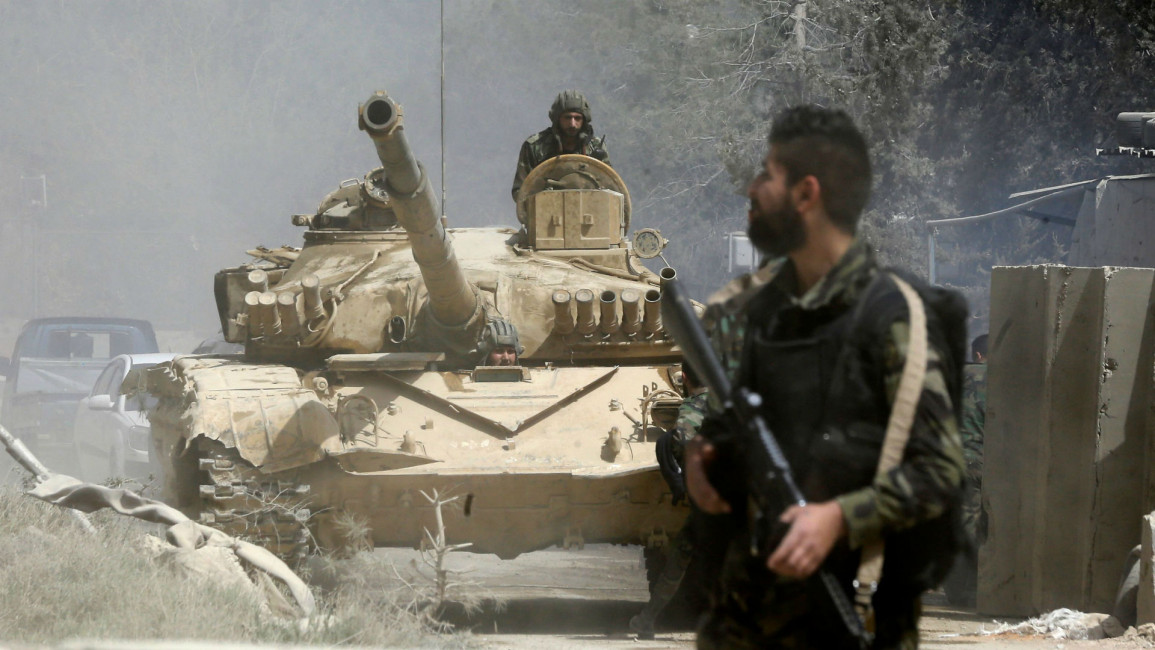Regime reclaims more ground in south Syria: monitor
A string of rebel-held locations in southern Syria passed into regime control on Sunday as the government regained more ground under Russian-brokered deals, a war monitor said.
Talks involving rebels, local officials and regime ally Russia saw agreements struck for four villages and a strategic town near the border with Jordan, extending government control to some 60 percent of the southern Daraa province, the Syrian Observatory for Human Rights said.
The agreements on Sunday covered four villages and the town of Bosra al-Sham, meaning that regime forces were now within 7 kilometres (4 miles) of the Jordanian border, the Britain-based Observatory said.
Since June 19, Russia-backed regime forces have ramped up bombardment against opposition fighters in southern Syria as Damascus pushes to retake the area.
A ceasefire deal meant that a tentative calm reigned over most fronts in the region from Saturday evening, but clashes in one area took the lives of at least 17 rebels and regime fighters, Observatory chief Rami Abdel Rahman noted.
The Daraa region borders Jordan and the Israeli-occupied Golan Heights and is considered to be the cradle of the uprising against President Bashar al-Assad seven years ago that sparked a deadly civil war that left thousands dead.
The regime has chipped away at rebel-held territory in Daraa since ratcheting up the violence almost two weeks ago, with Russia stepping in to oversee a string of deals to retake towns from the embattled rebels.
An AFP correspondent outside Daraa city - part of which is held by rebels - said Saturday night had been quiet, with only intermittent bombing.
Fighting had died down on most fronts on Sunday with the exception of areas near Tafas in Daraa's northwest which was hit by regime airstrikes, according to the monitor.
Clashes between rebels and regime forces and 22 air raids killed 10 opposition fighters and seven government troops, it said.
So far 132 civilians, including 25 children, have been killed in the latest surge in fighting in Daraa, according to the Observatory.
Damascus and Moscow are pushing for a deal that would see regime forces take over the Nasib border crossing with Jordan and deploy along the frontier with the Golan Heights, monitor head Abdel Rahman said.
Russia is seeking the rebel handover of heavy and medium-sized weapons, and the deployment of Russian military police and Syrian police into towns retaken by government forces, he said.
The regime has more than doubled the amount of territory it held in Daraa since escalating its military pressure.
On Saturday the regime retook eight towns under Russia-mediated deals.
State news agency SANA said the national flag had been hoisted in one of these towns, Dael, while Syrian state television showed images of people celebrating on Sunday.
Regime forces have retaken large parts of the country lost to rebels since Russia intervened on its behalf in 2015.
The conflict has killed more than 350,000 people and displaced millions since it started in 2011.
Returning home
Meanwhile, several dozen Syrian refugees left Lebanon for neighbouring Syria on Sunday as part of returns coordinated between both countries, authorities said.
A total of 42 Syrians returned voluntarily from Lebanon through the Masnaa crossing to areas in Syria, according to Lebanese authorities.
A Lebanese coordinator said they were headed for areas including Moadmiyet al-Sham, a suburb of Damascus where the regime retook control from rebels in October 2016.
Lebanon hosts just under one million registered refugees from the conflict in Syria, although authorities say the real number is much higher.
However, more and more are returning as the regime reasserts its control over larger parts of the country.
Nasrallah said Hizballah would take advantage of the summer months as Syrian families would want to be home before schools open in September.
But he warned of local and international efforts aimed at dissuading refugees from going home.
Lebanon's top diplomat Gebran Bassil has accused United Nations refugee agency UNHCR of trying to persuade refugees to stay in Syria, and retaliated by blocking the issuing of any new work permits for the agency's foreign staff.
More than 920,000 people were displaced inside Syria during the first four months of 2018, the highest level in the seven-year conflict.



